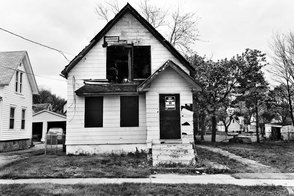 Paolo Pellegrin/Magnum Photos Paolo Pellegrin/Magnum Photos “They used to tell me I was building a dream With peace and glory ahead Why should I be standing in line Just waiting for bread?” —Bing Crosby, “Brother, Can You Spare a Dime” (1931) A foreclosed home in Rochester, New York, 2012 Some of us notice them, while others don’t seem to, even though there are 46.5 million of them according to the latest census and they are everywhere if one cares to look. A tall man in his late fifties, whose portrait might have once hung over the boss’s desk in some company office, packing grocery bags in a supermarket with grim efficiency; a meek-looking old couple in a drug store waiting their turn at the cash register with a bottle of generic ibuprofen and a box of tissues, who, upon learning the price for each put the tissues aside and pay with small change for the painkiller; a handsome, middle-aged father, unshaven and looking unkempt, waiting with his small son for a school bus outside a modest home in the suburbs; the tired and resigned look of fast food workers and store clerks in a mall, some of them young, but many of them middle-aged and even older, most of them being paid minimum wage for their work and needing an additional job, food stamps, or some other form of government assistance to support their families; a soup kitchen in New York with people who could be one’s relatives waiting patiently in line. Anyone who averts his eyes from the hopeless lives many of our fellow citizens lead and tells himself and others that these men and women only have themselves to blame, is either a fool or a soulless bastard. Not that those who still call themselves middle class are in great shape either. As one travels around the country, one is struck by how poorly dressed many Americans are and how run-down their cities and towns have become. Everyone knows what bankrupt Detroit looks like, but there are many other towns whose air of complete defeat is just as palpable. I once asked a taxi driver in one such place what people do there and he gave me a long list of all the big name manufacturers and businesses that have closed their doors over the past decade or two, confessing that he had no idea how his neighbors managed to make ends meet. I’ve no idea either. Even for people with impressive past work experience and a range of skills, finding a job that pays a wage one can live on and that comes with healthcare benefits has become extremely difficult. It’s especially hard for young people. It’s been years since I’ve heard of any of my graduate students getting a decent job. Working as a waiter or a waitress in a trendy restaurant where tips are good is often the best they can hope for. For many others, it’s much worse, of course. Fifty years after Lyndon Johnson declared a “War on Poverty,” the richest country in the world no longer cares if millions of its less fortunate citizens live or die. Continue reading at New York Review of Books My thanks to NYRB and Charles Simic, former US Poet Laureate, for a beautifully evocative piece of writing. Read another insightful and compelling essay by Charles Simic in the NYRB here. --EJT
...and the cry-call of a blue jay flying by my window |
Archives
February 2018
Categories
All
|
 RSS Feed
RSS Feed